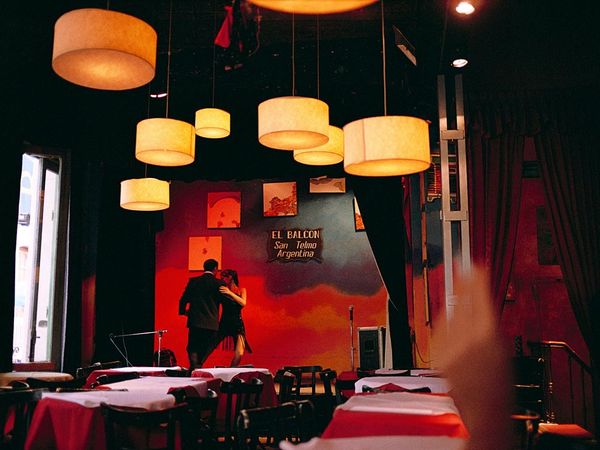Take a moment and listen to this hauntingly atmospheric music by twentieth century Argentine tango composer, Astor Piazzolla. Oblivion was written in 1982 and used in the soundtrack of Mario Bellocchio’s film, Enricho IV. There are many versions of this piece for different combinations of instruments. This performance features Latvian violinist, Gidon Kremer and comes from his CD, Hommage a Piazzolla.
Like all great music, Oblivion conjures up a complex mix of emotions which cannot be put into words. What feelings does this piece evoke for you? As you listen, pay attention not only to the melody, but to the underlying harmony and rhythm in the bass and piano.
For a contrast to Kremer’s performance, listen to this orchestral version played by the Montreal Symphony and Charles Dutoit. It’s an excerpt from a CD entitled Tangazo. If one version speaks to you more than another I’d be interested in hearing your thoughts. For more music by Piazzolla, visit my post featuring The Four Seasons of Buenos Aires.
Cellist, Yo Yo Ma has some interesting thoughts on Piazzolla’s music and the tango tradition in Argentina:
Tango is not just about dancing. It is a music of deep undercurrents. Because of what Argentina went through as a country, tango has become the soul of Argentina. Music is always one way people can speak when they aren’t allowed to express themselves otherwise. And Piazzolla’s tangos have the great strength of true voice…. Piazzolla’s music is endlessly passionate—full of yearning—and at the same time tremendously contemporary. There’s a quote to the effect that Piazzolla is the Ellington of Argentina, and in a way it’s true. He actually took the tango to another level by inhabiting his music. The music grew in him, and he adeptly incorporated the influences of his surroundings—whether from New York, Paris, or Buenos Aires. During the almost forty years he worked on his music, Astor Piazzolla tried many different variations—even tried an electronic ensemble! Because of this experimentation, and also his ingenuity, focus, and hard work, his music has many levels of expression and a tremendous depth. His is a truly successful synthesis of the tango and the contemporary.
Here is an excerpt from Yo Yo Ma’s recording called, Soul of the Tango: The Music of Astor Piazzolla.


Yo Yo Ma is right, Timothy. Tango is much more than dance music. It is culture, it is history, it is passion, it is the aching soul translated into notes. It is timeless. It has no frontiers: the Norwegian bandoneonist Per Arne Glorgiven performs it in Scandinavia; Cuarteto Soltango formed in Amsterdam and spreads its glory through the Netherlands; tango classes are held all over the place with increasing success.Thank you for posting Oblivion – the tango shan’t be forgotten.
Oblivion gives me a deep sense of stasis, yet constant movement; the smoothest and subtlest of progressions. A most romantic Tango, I think. If there is one “dance number” I wish to master with my beloved for our nuptial ceremony, it is this.
Just the most spellbinding and enchanting song. Brings sadness and joy, about letting go and moving forward. Can’t stop listening to the more cello based versions of this anthem.
I feel like, my soul is being scraped with a very thin glass scraper and with every stroke of it, vivid colors of left over youth shines through from the surface. I feel sad yet incredibly light.. I feel only this moment, nothing before or after… I am finally comprehending what “Now” means.. I will dance my first tango performance with this piece of amazing music, next month. Frisson of excitement and anticipation is in my spine…
wow how did it go.?the tango oblivion i mean…..
Exceptionally beautiful!
I have a specific orchestral version with bandoneon and acoustic guitar that is my go to version. Unfortunately, I couldn’t find a link to it.
I have a view which seems to be different in direction from all the above comments. “Oblivion” is easily the most gloriously and uninhibitedly sexual (and emphatically not erotic) piece I know. The words and music are inseparable. The composition is about the peaceful exhaustion and the sense of being totally fulfilled, and now somewhere beyond mere everyday contentment. The words “Mon bateau part, s’en va quelque part” refer metaphorically to drifting away into — for want of a better word — sleep. The fragmented images that follow have come at random into the singer’s peacefully fading consciousness ….. passing into oblivion. Sung by Milva, there is nothing left to the listener’s imagination.
Id like to add this to my comment: Hemingway describes the oblivion as “the little death”.